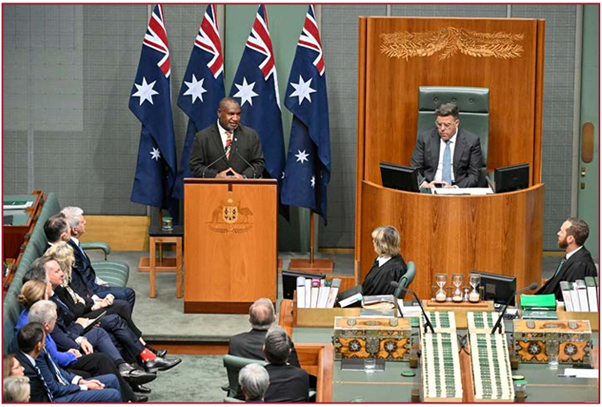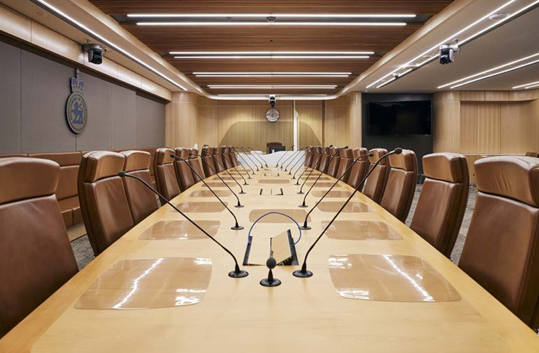Appointment of the First Aboriginal Liaison Officer at the Parliament of New South Wales


It has been 12 months since the Parliament of New South Wales employed its first Aboriginal Liaison Officer, to ensure the Parliament is better placed to engage with Aboriginal communities across New South Wales. This historic and deeply significant appointment, only the second to be made in Australia, was a huge step towards making the Parliament of New South Wales a more welcoming place for Aboriginal communities.
The role is an important resource for Members and staff, in supporting interactions with Aboriginal communities via their work in electorates across the State, providing advice on cultural protocols and significant events, assisting with committee activity and guiding Parliamentary events and programs. Over time, this role will help work towards breaking down the barriers that have traditionally been in place for Aboriginal people seeking to understand, access and engage with the Parliament of New South Wales, in recognition of the importance Aboriginal voices play in the future of the Parliament.
The Parliament’s Aboriginal Liaison Officer Steven Collins is a Pitta Pitta man, whose traditional lands are in Queensland. Steven has had a long career in the public sector and has led many projects to help bridge the gap between Aboriginal and non-Aboriginal communities. Steven’s recent role was at the New South Wales Public Service Commission, where he led the development of a training package designed to teach the State’s 400,000 public sector employees about the Stolen Generations and the impacts of forcible removal policies. The impacts of past forcible removal policies and practices on Aboriginal communities are still felt today. This period of Australia’s history is close to Steven’s heart, as he is a descendent of the Stolen Generations.
Increasing participation in Parliamentary activities
An important area of outreach for the Parliament is through its Committees, which regularly travel to rural areas across New South Wales to engage and consult communities on particular inquiry topics. Historically, Committees have at times struggled to engage with Aboriginal communities appropriately on inquiries, and Steven Collins has been working with the Committee offices to understand the barriers and start to develop strategies for greater Aboriginal participation. Some of these include working with the Committee staff on rewriting Committee resources to make them more culturally specific and inclusive, and leveraging its social media channels with targeted posts. These have proven to be an effective way for Committee inquiries to engage with Aboriginal communities.
In April 2021, the Joint Select Committee on Coercive Control travelled to Narrandera in the Riverina region of southern New South Wales to meet with domestic violence victim-survivors, indigenous organisations, frontline services and local charities from the across the State. The involvement of the Aboriginal Liaison Officer commenced in the planning phase of the Committee to ensure he had a detailed understanding of what the inquiry was about, to be able to provide sound advice to the Aboriginal communities on what that issue was going to look like for their engagement. Steven Collins was also on hand in Narrandera to provide advice to the Committee Members on culturally appropriate questioning of Aboriginal witnesses, as well as to ensure the participants felt comfortable about participating in the Committee process. Following the hearing, Steven briefed Committee staff on how future Committees and site visits could be run to better include Aboriginal voices. Steven was also very focused on his own learnings from the experience, to better work with Committee members and help them understand and engage with evidence from Aboriginal witnesses.
Further regional Committees were unable to go ahead, as travel outside of Sydney was prohibited during extended COVID-19 lockdowns in New South Wales. Going forward, the Aboriginal Liaison Officer will be attending more regional Committees, particularly those inquiries with strong Aboriginal engagement or where efforts are needed to increase Aboriginal participation.

Building relationships and partnerships
The Aboriginal Liaison Officer has looked for new and innovative ways for the Parliament of New South Wales to engage with Aboriginal communities, including building different relationships and partnerships. In the lead-up to NAIDOC (National Aborigines and Islanders Day Observance Committee) Week in July 2021, six Aboriginal guest chefs were invited in to the Parliament’s kitchens to showcase native ingredients on its menu, for the inaugural ‘Koori Kitchen Takeover’. The partnership with the National Centre of Indigenous Excellence and the National Indigenous Culinary Institute provided an opportunity for Parliament’s chefs to learn about native ingredients from the up-and-coming Aboriginal chefs, and to find ways in incorporate these flavours in future dishes at the Strangers’ Restaurant at New South Wales Parliament House.
Building on the success of Koori Kitchen Takeover, an idea was developed for a kitchen garden on the Parliament’s rooftop. There was also a desire from the Parliamentary Catering team to feature native ingredients more prominently in their menus. A variety of native edible plants has been seeded in the existing native garden including lemon myrtle, saltbush and native mint. This initiative was undertaken in collaboration with Indigrow, a specialist in Australian bushfoods and environmental services, who were consulted to provide advice and source the appropriate native plants for the garden.
An Acknowledgement of Country is a statement that recognises Aboriginal and Torres Strait Islanders as the Traditional Custodians of the lands in Australia, and allows people to pay their respects to Aboriginal and Torres Strait Islander peoples, dependent on the lands they are on. For many years, both Houses of Parliament in New South Wales have included an Acknowledgement of Country at the start of sittings. In line with this approach, an Acknowledgement of Country is now a part of each public tour of the Parliamentary precincts. This is an action that sends a strong message about the Parliament’s commitment to do better in this space. An Acknowledgment of Country plaque will also be installed in the precinct this year, as a simple foundational step towards upskilling people in their cultural capability and understanding of different community issues.
A ‘Leaders in Conversation’ online panel event was broadcast live from the Parliament of New South Wales to mark National Reconciliation Week in 2021. The panel featured leaders from across the New South Wales public sector unpacking what Aboriginal employment, retention and attraction meant to reconciliation action, whilst reflecting on the unique challenges and opportunities specific to the New South Wales public sector. This successful event will form part of an ongoing series run by the Parliament that brings leaders together to discuss topics of importance to Aboriginal people and communities, as well as a tool to educate Members and the broader community.
Finding opportunities for engagement with the Aboriginal community
The Parliament’s Reconciliation Wall is a dedicated space within the precinct for the display of Aboriginal artwork from both within the Parliament’s collection and from Aboriginal communities. Established in 1998, it is part of the Parliament’s commitment to reconciliation with Aboriginal people. An upcoming engagement project led by the Aboriginal Liaison Officer is a refresh of the Reconciliation Wall policy in the Parliament’s Fountain Court. While the Wall has been in place for many years, it is not well known in the Aboriginal community. The Parliament will lead interactions with various galleries and community groups around the State to actively encourage Aboriginal communities to use this free and accessible space for the display of artworks and for small exhibitions. This initiative provides an avenue to introduce the role of the Aboriginal Liaison Officer and the work Parliament is doing to increase engagement and trust outside of the institution. It also provides an opportunity for Aboriginal artists to display their works and share messages with Members and the broader community.
The Parliament of New South Wales is also honoured to acknowledge the twenty-fifth anniversary of the Apology to Stolen Generations in June. New South Wales was the first Australian State government to apologise to the Stolen Generations after the release of the Bringing them home report (1997), which revealed the magnitude of the separation of Aboriginal and Torres Strait Islander children from their families in the twentieth century. The Aboriginal Liaison Officer will work closely with Stolen Generations survivors as we commemorate and reflect on what has changed since.
The Parliament’s upcoming Bicentenary celebrations, commemorating 200 years since the establishment of the Legislative Council, will be key in building trust with the Aboriginal community in New South Wales, as the Parliament works to ensure the Aboriginal voice is heard as part of the Bicentenary, and to demonstrate an understanding of the shared history between colonial and Aboriginal people.

Increasing Aboriginal cultural capability at the Parliament
Much of the early focus of the Aboriginal Liaison Officer has been on external engagement. A key part of the work going forward at the Parliament of New South Wales will focus increasing the cultural capability of Members and staff. In March 2021, a delegation from the Parliament of New South Wales visited a native rooftop garden at the Cultural Landscape Garden at South Eveleigh in Sydney, co-designed by members of the local Aboriginal community. The visit inspired the Catering team, and provided them with the skills and knowledge to set out to achieve a similar garden of edible native plants.
Further, developing an understanding of the history of the relationship between Parliament and Aboriginal communities will help us attract and retain Aboriginal staff. The existing Aboriginal Employment Strategy will be revisited, and events held to showcase the Parliament as an ally to Aboriginal people. It is vital that Aboriginal staff are well supported in the workplace. Steven Collins has made a major contribution in providing advice on cultural practices that may impact on an Aboriginal employee such as connection to family and kinship structures.
The future
The past twelve months have seen much progress for the Parliament of New South Wales with its engagement with Aboriginal communities. The Parliament of New South Wales will continue to look for new ways to engage, seeking to build relationships and partnerships with Aboriginal communities. Ultimately the role of the Aboriginal Liaison Officer is to help connect, support and educate people, as well as to provide tools and skills to all employees in the organisation to ensure they are better able to engage with Aboriginal communities. This work does not fall solely on the shoulders of the Aboriginal Liaison Officer Steven Collins – everyone in the Parliament of New South Wales has a shared responsibility to champion the changes that signal progress and healing.


